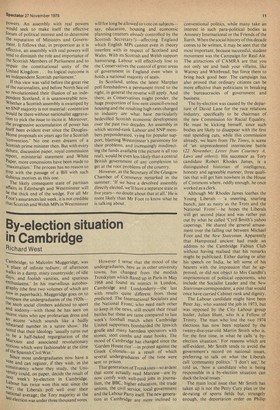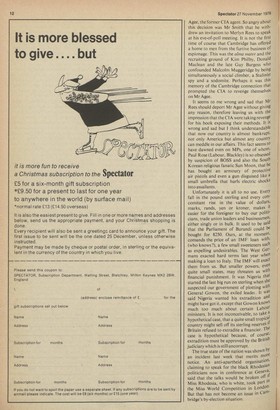By-election situation In Cambridge
Richard West
Cambridge, to Malcolm Muggeridge, was a Place of infinite tedium; of afternoon Walks in a damp, misty countryside; of idle days, and foolish vanities, and spurious enthusiasms.' In his marvellous autobiography (the first two volumes of which are now in paperback), Muggeridge goes on to enmPare the undergraduates of the 1920s— the snob social climbers addicted to sport and sodomy—with those he has seen on recent visits who ape proletarian dress and an accent 'which sounds like a badly rehearsed number in a satire show.' He noted that their ideology 'usually turns out to be a half-baked regurgitation of the Marxism and associated revolutionary notions which were fashionable at the time Of the Spanish Civil War.' Since most undergraduates now have a vote and can register, if they wish, in the constituency where they study, the Uniersity could, on paper, decide the result of next week's by-election in Cambridge. Labour has twice won this seat since the war; the Liberals poll well over their !rational average; the Tory majority at the Iast election was under three thousand votes. However I sense that the mood of the undergraduates, here as in other university towns, has changed from the modish Trotskyism which flared up in Paris in May 1968 and found its mimics in London, Cambridge and Londonderry—the last with results quite different from those predicted. The International Socialists and the National Front, who need each other to keep in the news, still mount their ritual battles but these are tame compared to last week's football match when Cambridge United supporters bombarded the Ipswich goalie and many harmless spectators with stones, steel combs and meat hooks. The mood of Cambridge has changed since the 'Garden House riot'—in protest against the Greek Colonels—as a result of which several undergraduates or the time were sent to prison.
That generation of Trotskyisrs—so ardent that some actually read Marcuse—are by now comfy with well-paid jobs in journalism, the BBC, higher education, the trade unions, the civil service, local government and the Labour Party itself. The new generation at Cambridge are more inclined to conventional politics, while many take an interest in such para-political bodies as Amnesty International or the Friends of the Earth. When the social history of this decade comes to be written, it may be seen that the most important, because successful, student movement was the Campaign for Real Ale. The attractions of CAMRA are that you not only see and bash your villains, like Watney and Whitbread, but force them to bring back good beer. The campaign has also proved that ordinary citizens can be more effective than politicians in breaking the bureaucracies of government and business.
The by-election was caused by the departure of David Lane for the race relations industry, specifically to be chairman of the new Commission for Racial Equality. He must be kicking himself, since such bodies are likely to disappear with the first real spending cuts, while this commission already, we learn from The Times, is scene of 'an unprecedented internecine battle (22 November; Letter from Courtney A. Laws and others). His successor as Tory candidate Robert Rhodes James, is a distinguished historian of intelligence, honesty and agreeable manner, three qualities that will get him nowhere in the House of Commons where, oddly enough, he once worked as a clerk.
Although Mr Rhodes James loathes the Young Liberals — 'a sneering, snarling bunch, just as nasty as the Trots and the National Front'—he hopes the Liberals will get second place and was rather put out by what he called 'Cyril Smith's yahoo caperings.' He shared the general amusement over the falling out between Michael Foot and the New Statesman. Apparently that Hampstead ancient had made an address to the Cambridge Fabian Club without having realised that his remarks might be publicised. Either during or after his speech on India, he left some of his hearers with the impression that he approved, or did not object to Mrs Gandhi's imprisonment of political opponents, who include the Socialist Leader and the New Statesman correspondent, a post that would once have carried Cabinet rank and dignity.
The Labour candidate might have been Peter Jay, who wanted the job in 1973, but was opposed by the City Labour group leader, Julian Hunt, who is a Fellow of Trinity. The man who lost the two 1974 elections has now been replaced by the twenty-five-year-old Martin Smith who is, for the first time, in what he calls 'a byelection situation.' For reasons which are self-evident, Mr Smith tends to avoid the government's record on national issues, preferring to talk on what the Liberals call 'community politics.' I don't see,' he told us, 'how a candidate who is being responsible in a by-election situation can duck the local issues.'
The main local issue that Mr Smith has taken up is not the Petty Cury plan or the de-rating of sports fields but, strangely enough, the deportation order on Philip
Agee, the former CIA agent. So angry about this decision was Mr Smith that he with drew an invitation to Merlyn Rees to speak at his eve-of-poll meeting. It is not the first time of course that Cambridge has offered a home to men from the furtive business of
espionage. This was the alma Inciter and the recruiting ground of Kim Philby, Donald
Maclean and the late Guy Burgess who confounded Malcolm Muggeridge by being simultaneously a social climber, a Stalinist spy and a sodomite. Perhaps it was this memory of the Cambridge connection that prompted the CIA to revenge themselves on Mr Agee.
It seems to me wrong and sad that N Rees should deport Mr Agee without givir any reason, therefore leaving us with ti impression that the CIA were taking reven1 for his book exposing their methods. It wrong and sad but I think understandab that now our country is almost bankruP not only America but almost any countl can meddle in our affairs. This fact seems I have dawned even on MPs, one of whon Paul Rose (Labour, Black ley) is so obsesse by suspicion of BOSS and also the Soul Korean religious fanatic Sun Moon, that has bought an armoury of protectil air pistols and even a gun disguised like small umbrella that hurls electric shod. into assailants.
Unfortunately it is all to no use. Every fall in the pound sterling and every cot comitant rise in the value of dollars. marks, rands, yen or kroner, makes. it easier for the foreigner to buy our polit cians, trade union leaders and businessmer
either singly or in bulk. It used to be said that the Parliament of Burundi could be
bought for 8250. Ours, at the moment, cornands the price of an IMF loan wird'. (who knows?), a few small sweeteners suc as expelling undesirables. The West Gel mans exacted hard terms last year whe making a loan to Italy. The IMF will exa( them from us. But smaller powers, eve quite small states, may threaten us wit financial punishment. It was Nigeria tha started the last big run on sterling when stt suspected our government of plotting wid General Gowon, the exiled leadei . It was said Nigeria wanted his extradition ary might have got it, except that Gowon know much too much about certain Labou ministers. It is not inconceivable, to take hypothetical case, that a quite small tropica. country might sell off its sterling reserves I Britain refused to extradite a financier. Th' case is hypothetical because, of course extradition must be approved by the Brats' judiciary which is still uncorrupt. The true state of the nation was shown 1/ an incident last week that merits moll notice. An anti-apartheid organisation claiming to speak for the black Rhodeslat politicians now in conference at Cieneva. said that the talks would be broken off! Miss Rhodesia, who is white, took part ir the Miss World Competition in London But that has not become an issue in C bridge's by-election situation.ar'











































 Previous page
Previous page